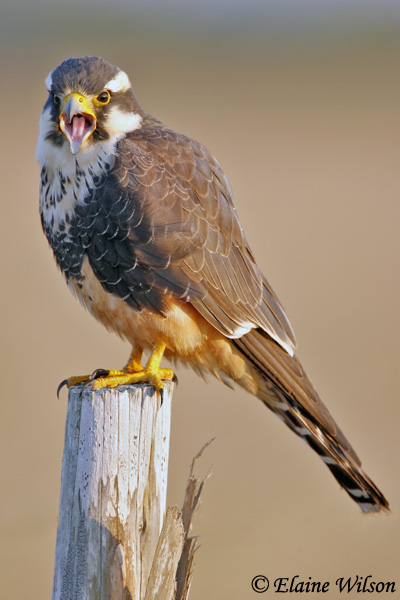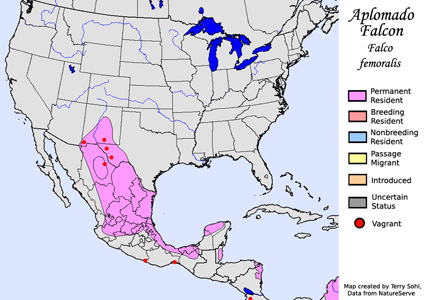| Length: 16 inches | Wingspan: 36 inches | Seasonality: Non-resident in South Dakota |
| ID Keys: Strong facial pattern with white eyebrow, dark overall with buffy underparts, white cheeks and chest, dark "mustache" stripe | ||
 The
Aplomado Falcon is a widespread raptor with a range that covers much of
South America, Central America, and southern Mexico. They used to
commonly range much further north, with nesting occurring in the
southwestern United States. However, by 1960, the species was
evidently extirpated from its United States range, as well as large parts of
northern and central Mexico. The last known nesting in the U.S. was in
New Mexico in the 1950s, until the successful nesting of a pair in 2002.
Significant efforts have been made to reintroduce the species in southern
Texas, and the species has been increasingly seen in New Mexico as well in
recent years.
The
Aplomado Falcon is a widespread raptor with a range that covers much of
South America, Central America, and southern Mexico. They used to
commonly range much further north, with nesting occurring in the
southwestern United States. However, by 1960, the species was
evidently extirpated from its United States range, as well as large parts of
northern and central Mexico. The last known nesting in the U.S. was in
New Mexico in the 1950s, until the successful nesting of a pair in 2002.
Significant efforts have been made to reintroduce the species in southern
Texas, and the species has been increasingly seen in New Mexico as well in
recent years.
Habitat: They can be found in open grassland habitats with scattered shrubs and trees, as well as open marshy areas. They will also use large forest clearings.
Diet: Small birds make up a large portion of the diet. They also often feed on large insects, and will sometimes take small rodents, small lizards and snakes, and bats.
Behavior: Most prey is taken on the wing. Aplomado Falcons can often been seen capturing insects from mid-air, and consuming them in flight. Mated birds often hunt cooperatively.
Nesting: Nesting usually occurs in stick nests built by other birds. Both the male and female will incubate the eggs (typically 2 or 3), and both parents will help to raise the young.
Interactive eBird Map: Click to access an interactive eBird map of Aplomado Falcon sightings
Song: A sharp kek-kek-kek alarm call is given when disturbed or when a bird senses danger.
Migration: Aplomado Falcons are permanent residents in most of their range, but birds do make altitudinal migrations, with birds that summer at higher elevations moving to lower elevations in the winter.
Similar Species: Peregrine Falcon
Conservation Status: Populations of the Aplomado Falcon are considered stable, and the species has a widespread distribution. They are considered a species of "Least Concern" by the IUCN. They have, however, been extirpated from parts of their former range, including large portions of northern and central Mexico, and the southwestern U.S.
Further Information: 1) Cornell's Neotropical Birds - Aplomado Falcon
2) Audubon - Aplomado Falcon
3) Texas Parks & Wildlife - Aplomado Falcon
Photo Information: December 2005 - Laguna Atascosa National Wildlife Refuge, Cameron County, Texas - Elaine Wilson
| Click below for a higher-resolution map |
 |
| South Dakota Status: Non-resident in South Dakota |
Additional Aplomado Falcon Photos (coming soon!!)
